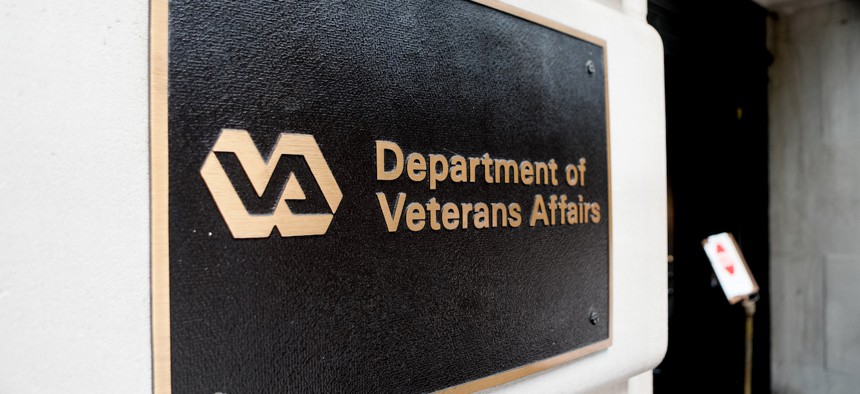
The tentative agreement must still be ratified by union members. P_Wei/Getty Images
AFGE and VA Reach a Tentative Deal on a New Contract
The agreement comes just weeks after an arbitrator found that the Veterans Affairs Department engaged in bad faith bargaining with the federal employee union.
This story has been updated at 10:30 a.m. April 7 to include comment from VA management.
The nation’s largest federal employee union on Thursday announced that it had reached a tentative agreement with the Veterans Affairs Department on a new collective bargaining agreement, potentially ending years of acrimonious negotiations.
The American Federation of Government Employees and VA management have been at loggerheads over how to revise their union contract since the Trump administration. It was last updated in 2011. Under President Trump, the Federal Service Impasses Panel imposed a largely pro-management contract on the parties, but the union failed to ratify it, effectively blocking its implementation until President Biden took office.
In July 2021, AFGE and the VA reached a settlement agreement to dispense with a variety of outstanding grievances and unfair labor practice complaints stemming from the Trump-era negotiations and setting the stage for a new round of bargaining on a new contract. But despite renewed commitments from management to bargain in good faith, negotiations remained adversarial, as department officials tried to retain Trump-era policies in the new contract, eventually leading to AFGE asking VA Secretary Denis McDonough to replace his chief negotiator last August.
Last month, shortly after the one-year anniversary of the start of negotiations, an independent arbitrator issued a 39-page decision finding that VA management had continued to engage in bad faith bargaining, stemming from union complaints in part about the department’s insistence on voiding dozens of agreements and memoranda of understanding that had been negotiated at the local level. And though VA claimed that tentative agreements had been reached at every bargaining session, the union disputed those assertions and said that since the arbitration ruling, management had begun trying to slip its provision excising local agreements into other articles of the contract.
Thomas Dargon, a supervisory attorney for AFGE who has aided the union’s National Veterans Affairs Council in its negotiations, said he believed the arbitration decision ultimately helped the parties quickly progress to a final deal. That deal allows VA to implement a plan to streamline hiring of Title 5 employees across the department, but otherwise preserves the provisions of the 2011 contract in full.
“I have more gray hairs on my head; that’s what changed for me,” he joked. “But what happened I think was we reached the one-year anniversary of these negotiations—we’ve been at the table since March 2022—and GovExec and several other news outlets covered our arbitration victory that reinforced many of the legal arguments we’ve been making at the table. Fortunately, since then, we’ve been able to accelerate our discussions.”
Dargon said management’s desire to speed up hiring dovetailed with the union’s interest in ensuring VA facilities are fully staffed. Last month, the VA reported that although it is hiring new employees at record rates, employees said it still isn’t fast enough to meet growing demand spurred by the enactment of the PACT Act, which makes millions of veterans exposed to burn pits overseas eligible for care through the department.
“What we’ve agreed to here is a plan to modernize and streamline some of the hiring processes for Title 5 employees with the hope it will improve the speed to hire and staff faster and more efficiently,” Dargon said. “They’ve been asking for these revisions in the contract. They’ve told us that they’ll work, and full staffing is everyone’s top priority. We want that just as much as VA does.”
“AFGE is proud to have come to an agreement with Secretary McDonough in these negotiations to modernize our current contract language and improve the hiring process, while maintaining contract protections that will help the VA to fill vacancies expeditiously and continue delivering world-class care to our nation’s veterans,” said AFGE National Veterans Affairs Council President Alma Lee in a statement. “For years our union has highlighted the danger of leaving tens of thousands of health care positions vacant, and we are hopeful this new agreement will help address this issue that is critical to both veterans and the VA workforce.”
In a statement Thursday evening, McDonough touted the deal, which he said also included the reinstatement of official time for the department's Title 38 medical professionals, reestablishes labor-management councils and other forms of predecisional discussions, and creates a task force to address employee burnout.
"This tentative agreement is a great step forward that will help us hire, support, retain and onboard VA’s great public servants—which, in turn, will help us better serve our nation’s veterans,” he said. “A unionized VA workforce is a strong VA workforce, and we are proud to work with AFGE to continue delivering world-class care and benefits to veterans, their families, caregivers and survivors.”
The tentative agreement must still be ratified by union members, which AFGE said will take place over the next 60 days. If ratified, the deal will go through the agency head review process and then be signed by both parties.







